|
|
|
Sort Order |
|
|
|
Items / Page
|
|
|
|
|
|
|
| Srl | Item |
| 1 |
ID:
183264


|
|
|
|
|
| Summary/Abstract |
The rapid fall of Afghanistan to the Taliban almost immediately led US policymakers to cast blame on the intelligence community for a failure to warn of the Afghan Army’s imminent collapse. Yet an examination of historical case studies from Vietnam and Iraq, and emerging evidence regarding Afghanistan, suggests that the real failure lies in the intelligence–policy relationship. In these three cases spanning 60 years, US policymakers consistently lacked receptivity to objective intelligence assessments that were critical of military missions to train and equip foreign armies facing insurgencies. Rethinking the intelligence–policy relationship to rely more heavily on working-level officials’ perspectives, demonstrate openness to bad news and integrate alternative intelligence analysis into the policymaking process would increase the likelihood that viable military policies will succeed in the future, as well as the likelihood that futile policies will be abandoned.
|
|
|
|
|
|
|
|
|
|
|
|
|
|
|
|
| 2 |
ID:
183260
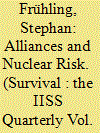

|
|
|
|
|
| Summary/Abstract |
There is a fundamental tension between the Biden administration’s stated intent to strengthen US alliances while at the same time reducing the role of US nuclear weapons. The credibility of extended-deterrence commitments – which in times of great-power conflict lie at the heart of US alliances – hinges on US allies and adversaries believing that Washington would resort to nuclear weapons to defend the core interests of its allies. A no-first-use or sole-purpose declaration would undermine deterrence and alliances by qualifying US security guarantees. The Biden administration and US allies should focus on coupling allied security to the threat of US nuclear use, to risks of inadvertent escalation for adversaries, and to the value of limited nuclear use in addressing conventional military imbalances in the Indo-Pacific. Forward-basing US nuclear forces in the region, where they are currently absent, is key to achieving all three of these aims.
|
|
|
|
|
|
|
|
|
|
|
|
|
|
|
|
| 3 |
ID:
183256


|
|
|
|
|
| Summary/Abstract |
Linking intelligence and policy is crucial for advancing national strategic interests. Especially important intelligence for policymakers includes key trends in national security, relevant data and probabilities of major military confrontations, such as a clash between the United States and China. It is also essential for intelligence agencies to articulate the degrees of confidence they have in their assessments. This requires them to ask themselves how reliable the available evidence is, what the range of opinion on the issue is, and what it would take for them to change their views. To better answer these questions, US intelligence agencies could consider more systematic approaches to crowdsourcing and testing their own findings.
|
|
|
|
|
|
|
|
|
|
|
|
|
|
|
|
| 4 |
ID:
183261
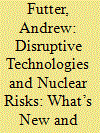

|
|
|
|
|
| Summary/Abstract |
Hype and fear have arisen about how certain technological developments are impacting the current nuclear order. New weapons systems and support facilities, potential vulnerabilities and associated destabilising dynamics could all place considerable strain on the global nuclear balance and accompanying architecture. This article examines five disruptive dynamics, explains their intricacies and nuances, and puts them in political and strategic context. The nature of nuclear risk is changing (in many cases for the worse), and there are a number of pressures which could have significant negative implications for escalation, stability and order if left unchecked. But these phenomena remain fundamentally political, and there are political mechanisms which can help reduce risks. Accordingly, while the risks posed by disruptive technologies to the nuclear order are real and growing, they should not be insurmountable.
|
|
|
|
|
|
|
|
|
|
|
|
|
|
|
|
| 5 |
ID:
183266
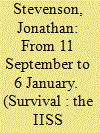

|
|
|
|
|
| Summary/Abstract |
Two books examine the connection between the 11 September 2001 attacks and the 6 January 2021 insurrection in the United States. In Reign of Terror, Spencer Ackerman overreaches in arguing that 9/11 led directly to 6 January by impelling the Bush administration’s expansion and empowerment of the ‘Security State’, which encouraged government officials and the American public to embrace right-wing extremism and Donald Trump’s authoritarianism. Factors other than the ‘war on terror’ amply explain America’s sharp turn to the right and Trump’s ascendancy. In Subtle Tools, Karen Greenberg offers the more nuanced and credible argument that Trump and his inner circle simply used the degradation of language, ‘bureaucratic porousness’, reflexive secrecy and the rejection of precedent arising from the policy and statutory responses to 9/11 to stoke right-wing extremism and manipulate government security policy and institutions.
|
|
|
|
|
|
|
|
|
|
|
|
|
|
|
|
| 6 |
ID:
183257
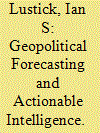

|
|
|
|
|
| Summary/Abstract |
In geopolitics, even rough probabilistic forecasts are difficult to make. Scenario design, table-top simulations and structured discussions are heuristic activities that focus the attention of analysts and increase policymaker satisfaction with intelligence products, but their usefulness is not based on confidence that forecasts are accurate. Traumatised by 9/11 and encouraged by advances in social science, computerised data collection and artificial intelligence, the US government has greatly increased investments in reliable geopolitical forecasting. Despite progress by using computerised data processing, sophisticated statistical methods and machine learning, the results have so far been of limited practical assistance. Forecasters must not only provide credible probability judgements but also show the causal pathways underlying them to enable policymakers to mitigate harms and exploit opportunities. Building that capacity means enhancing the role of social scientists in the design and testing of computer simulation and other forecasting techniques.
|
|
|
|
|
|
|
|
|
|
|
|
|
|
|
|
| 7 |
ID:
183255
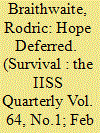

|
|
|
|
|
| Summary/Abstract |
The Soviet Union was formally replaced by the Russian Federation on 25 December 1991. Americans felt they had won the Cold War. Russians felt an angry sense of humiliation. The Soviet potential for collapse had become visible after Josef Stalin died in 1953. It was not corrected by the Soviet leadership nor picked up by Western governments, and it was masked by Soviet military and international success. But eventually the Soviet leadership could no longer ignore the growing crisis. They appointed Mikhail Gorbachev to find a remedy. He failed. His eventual successor, Vladimir Putin, used force to restore Russia’s role abroad, but ran an increasingly brutal and corrupt regime at home. Russians had hoped that Russia might become prosperous and stable, on good terms with its neighbours. Though that hope was much diminished by Christmas 2021, a flicker nevertheless remained.
|
|
|
|
|
|
|
|
|
|
|
|
|
|
|
|
| 8 |
ID:
183263
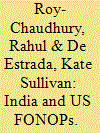

|
|
|
|
|
| Summary/Abstract |
India and the United States have recently and rapidly consolidated a significant bilateral defence partnership, have a clear appetite for bilateral and quadrilateral maritime cooperation, and appear to share a common commitment to the rules and norms that govern the maritime domain. Yet the US decision to undertake and publicise a freedom-of-navigation operation targeting India in April 2021 again highlighted the two countries’ divergent interpretations of the United Nations Convention on the Law of the Sea (UNCLOS) and of customary international law. This divergence has its origins in differences in Washington’s and New Delhi’s historical engagement with UNCLOS and their preferred means of achieving security and status in the Indo-Pacific. Such differences currently preclude a deep bilateral consensus on maritime order and a common multilateral position within the Quadrilateral Security Dialogue.
|
|
|
|
|
|
|
|
|
|
|
|
|
|
|
|
| 9 |
ID:
183259


|
|
|
|
|
| Summary/Abstract |
In the past year, climate change and national security have received significant attention from policymakers in the United States and the international community. Despite high-level meetings and statements on the topic, however, climate change is not yet fully mainstreamed into policymakers’ national-security agendas, particularly in areas related to geopolitical competition and governance. Better integration of climate-related predictive capabilities into national-security planning and the development of an interdisciplinary, scientifically literate national-security workforce are needed to address this gap.
|
|
|
|
|
|
|
|
|
|
|
|
|
|
|
|
| 10 |
ID:
183254


|
|
|
|
|
| Summary/Abstract |
Having rebuilt its military, Russia invaded Ukraine in 2014 and has now positioned more than 100,000 troops on its borders, challenging NATO’s supposed encirclement of Russia and its military capabilities in Central Europe. The West has responded with threats of unprecedented sanctions. This crisis stems from the Soviet Union’s collapse and the West’s effort to create a ‘Europe whole and free’ and at peace. The West failed to convince Russia to play a positive role in Europe and to help it do so. NATO declared that Ukraine and Georgia, on Russia’s borders, would someday become Alliance members. Nevertheless, the US and NATO are conducting serious diplomacy with Russia. Confidence-building measures, including on conventional forces, are the best alternative to confrontation. A new cold war will benefit no one, Russia least of all.
|
|
|
|
|
|
|
|
|
|
|
|
|
|
|
|
| 11 |
ID:
183258


|
|
|
|
|
| Summary/Abstract |
The US military rightly focuses on a Taiwan-invasion scenario for force planning, but to understand the odds of Sino-American war a range of scenarios must be examined. Consideration of five scenarios suggests that none of the wars that China might intentionally start are very attractive from Beijing’s perspective, providing the United States and its allies with time to strengthen deterrence. The greatest risk of a Sino-American conflict in the near term is inadvertent or accidental escalation caused by misperception or miscalculation. As the United States takes steps to bolster deterrence and reduce the risks of deliberate war, it must simultaneously put in place crisis-management mechanisms to prevent inadvertent or accidental escalation.
|
|
|
|
|
|
|
|
|
|
|
|
|
|
|
|
| 12 |
ID:
183265


|
|
|
|
|
| Summary/Abstract |
This article explores why Chinese diplomats have become so aggressive, discarding the professionalism and courtesy that have facilitated China's engagement with the world for more than four decades. Some argue that Chinese diplomats want to distract foreign audiences from Beijing's handling of the COVID-19 pandemic. Others suggest that they are trying to demonstrate their strength abroad in response to popular nationalism at home. Still others argue that their bluster is intended to show their loyalty to President and Chinese Communist Party General Secretary Xi Jinping. All of these explanations appear to be valid to some extent.
|
|
|
|
|
|
|
|
|
|
|
|
|
|
|
|
|
|
|
|
|